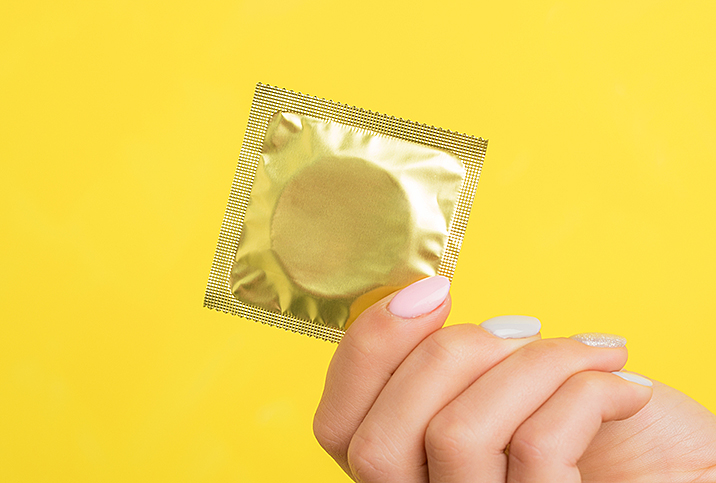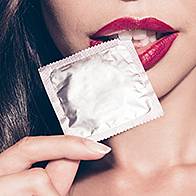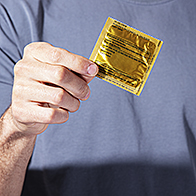Why Vegans (And Everyone Else) Should Take a Closer Look at Condoms

Whether to avoid harming animals or in hopes of cutting down on the carbon emissions created in animal agriculture, plant-based lifestyles are becoming more popular. Aside from the 6 percent of the American population reported to completely avoid meat and animal products, 39 percent identify as omnivores, but prioritize limiting their consumption of animal products. However, veganism isn't limited to what we put inside our bodies, but also on our bodies.
Or rather, what we put on and in other people's bodies.
No animal was harmed...
As many aspiring vegans will tell you, animal products and byproducts end up in just about anything, even items as unexpected as condoms. These ingredients have the aim of improving the sexual experience, but those with a strong moral stance against animal products should keep an eye out.
"The main non-vegan ingredients that get added to latex are casein (milk-derived, usually added to make condoms smoother), glycerin from tallow/fat and l-arginine (an amino acid from animal cells)," said Ericka Durgahee, business development marketing manager of the Vegan Society, which has certified products as vegan via extensive auditing for more than 30 years. "There can also be 'natural condoms' that are made from lamb cecum, which is the intestinal membrane of a lamb."
However, it's not just vegans that might want to steer clear of lambskin condoms, as Sara C. Flowers, Dr.PH., vice president of education and training at Planned Parenthood, notes. She has her fair share of condom expertise: The organization has 600 health centers across the United States, each distributing free condoms.
"It's important for people to know that condoms made of lambskin or other animal membranes do not protect against STIs—they only help prevent pregnancy," Flowers said.
The hidden life (and dangers) of condoms
Flowers and Durgahee both emphasize that, vegan or not, anyone using a condom should be aware of the product's ingredients. For Flowers, it's an issue of safety.
"Condoms without spermicide are better at preventing STIs than spermicidal condoms," Flowers continued. "That's because nonoxynol-9, a chemical in most spermicides, can irritate your skin, which can make it easier for infections to get in your body."
Durgahee agrees that some ingredients can be more trouble than they're worth—for a few reasons.
"Our bodies are absorbent, and you want to know what they're coming into contact with," Durgahee said. "Often it's the chemicals in the condoms that cause a reaction and not always an allergy to latex. We see that many synthetic condoms are petroleum-based and often even contain plastics, which will not biodegrade and are resource-heavy in production."
What may initially appear to be a latex allergy could actually be the body's reaction to any number of chemicals present in a condom. These additives don't just affect our bodies while we use them, they also determine how a used condom interacts with the world once we're done with it. Whenever a synthetic product mixes with oils, bodily fluids or any number of residues, it becomes tainted and can't be recycled.
Even if a condom is created using a recyclable rubber, the semen or other bodily fluids retained eliminate the possibility of recycling. This means the ideal product would be biodegradable, natural-rubber-based condoms. Worrying about what happens to a condom after it's been used isn't everyone's priority, especially while STIs remain on the rise. However, it's a very legitimate concern: Besides sounding scary, petroleum-based condoms do add to the world's reliance on the oil industry.
Ideals aside, vegan condoms can cost more or be less accessible to some than their non-vegan counterparts. Your health always comes first, so any condom is better than going without.
Regardless of where you stand on what happens to a condom after it's been used, the whole issue is a reminder to critically question much of what we take for granted. Perhaps this looks like donning reading glasses to check out an ingredients list we'd normally skip over or considering where a product goes after we use it, but maintaining your own health and the health of the planet may be worth a little mindfulness.




















